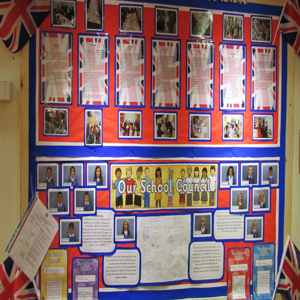British Values Statement
At Shobnall Primary & Nursery School, our vision is to prepare our learners for life in modern Britain and equip them fully for life in the 21st century. Cultural capital gives our students the vital background knowledge required to be informed and thoughtful members of our community who understand and believe in British values. We recognise the multi-cultural and multi-faith nature of the United Kingdom and understand the crucial role our school plays in promoting these values. We encourage admissions from all those entitled to education under British law regardless of faith, ethnicity, gender, sexuality, political or financial status. We are a school for all. This statement outlines the key British values we actively promote.
The Department for Education states that there is a need:
“to create and enforce a clear and rigorous expectation on all schools to promote the fundamental British values of democracy, the rule of law, individual liberty and mutual respect and tolerance of those with different faiths and beliefs”.
The Department for Education defines British Values as follows:
- Respect for democracy and support or participation in the democratic process
- Respect for the basis on which the law is made and applies in England
- Support for equality of opportunity for all
- Support and respect for the liberties of all within the law
- Respect for and tolerance of different faiths and religious and other beliefs
All curriculum areas provide a vehicle for furthering understanding of these concepts and, in particular, RE and PSHE provide opportunities to deepen and develop understanding. We encourage our children to be creative, unique, open-minded and independent individuals, respectful of themselves and of others in our school, our local community and the wider world. We aim to nurture our children on their journey through life so they can grow into safe, caring, democratic, responsible and tolerant adults who make a positive difference to British Society and to the world.

British Values in Practice
Democracy
Pupils know that they have a voice in the school that is heard, are able to make democratic decisions and point to improvements that they feel need to be made to enhance provision for them in school.
We have a School Council, Anti-Bullying Ambassadors, Eco-Warriors, Happiness Heroes, Safeguarding Advocates and Reading Ambassadors with elected representatives from each class in the school. All children are able to put themselves forward to their classmates and a ballot is held and pupils are voted for. Meetings are guided by an agenda, chaired by a member of staff and pupils ensure that they make decisions based on their discussions. Understanding of Parliament and democratic decision making has been enhanced by a visit from our local MP. In addition to School Council, Eco-Warriors, Happiness Heroes, Safeguarding Advocates, Reading Ambassadors and Anti-Bullying Ambassadors, pupils can become Active Playground Leaders and are encouraged to take on a number of responsibilities in Year 6 (e.g. monitors, librarians). Staff support them with development of appropriate leadership skills, understanding of timekeeping and the impact their role has on others.
All children are encouraged to debate topics of interest, express their views and make a meaningful contribution to the running of the school on matters that directly involve pupils. They also have a voice via the classroom mindful monsters where they can raise concerns and share ideas.
Pupils also have the opportunity to have their voices heard through pupil questionnaires and pupil conferences and have contributed to the development of our aims and vision.
Pupils are also actively involved in the selection processes of new staff.
The Rule of Law
Pupils are helped to respect the law. They are taught the value and reasons behind laws, that they govern and protect us, the responsibilities that this involves and the consequences when laws are broken. They are helped to understand that living under the rule of law protects individuals. Visits from the Police, the Fire Service etc. are regular parts of our calendar and help reinforce this message.
Our Behaviour and Anti-Bullying procedures encourage the restorative justice process to resolve conflict. The school has zero-tolerance for any form of aggression, abuse or violence, which extends to pupils, staff and parents/carers. This understanding is reflected through the Behaviour Procedures devised by the children that is displayed in every classroom.
We are committed to praising children’s efforts. Children are rewarded not only for achievement in curriculum areas, but also for behaviour. Rewards are given in the form of stickers, house points and certificates. Children’s achievements are also recognised during Celebration Assemblies every Friday.
The importance of laws and rules, whether they are those that govern the class, the school or the country, are consistently reinforced throughout regular school days. Our system for behaviour is aligned to an agreed code and pupils are helped to distinguish right from wrong.
Individual Liberty
Within school, pupils are actively encouraged, and given the freedom to make choices, knowing that they are in a safe and supportive environment. For example, by signing up for extra-curricular clubs, choosing the level of challenge in some lessons and becoming increasingly more involved in child-led learning. A further example is where foundation stage children have the opportunity to choose their extended learning through adult guided child initiated play.
As a school we educate and provide boundaries for our pupils to make choices safely, through the provision of a safe environment, a planned curriculum and an empowering education. Pupils are supported to develop their self-knowledge, self-esteem and self-confidence and are encouraged to take responsibility for their behaviour, for example through our Forest Schools provision, or through online safety.
Vulnerable pupils are protected, stereotypes challenged and a strong anti-bullying culture is embedded throughout the school.
Pupils have key roles and responsibilities in school e.g. Library Monitors, Anti-Bullying Ambassadors, Eco-Warriors etc.
We also encourage a level of financial responsibility with our children. They are able to bring a small amount of money to spend on a snack each morning playtime as well as taking money on educational visits and planning their own fundraising and enterprise events.
Mutual Respect and Tolerance of Those with Different Faiths and Beliefs
Respect is one of the core values of our school. This can be seen and felt in our ethos in school. Pupils know and understand that it is expected and imperative that respect is shown to everyone, whatever differences we may have and to everything, however big or small.
The school strongly promotes respect for individual differences and pupils are helped to acquire an understanding of, and respect for, their own and other cultures and ways of life. Staff and pupils are encouraged to challenge prejudicial or discriminatory behaviour.
Actively promoting our values also means challenging pupils, staff or parents expressing opinions contrary to fundamental values, including ‘extremist’ views.
Links and visits are promoted with local faith communities and places of worship. Through PSHE and RE, pupils are encouraged to discuss and respect differences between people, such as differences of faith, ethnicity, disability, gender or sexuality and differences of family situations, such as looked after children or young carers.
Assemblies and discussions involving prejudices and prejudiced-based bullying have been followed and supported by learning in RE and PSHE.
We offer a culturally rich and diverse curriculum in which all major religions are studied and respected and global dimension work embedded in many of our topics.
Documents
Please click on the links below to view some of our key documents related to the promotion of British values in school.
What is SMSC?
Pupils’ spiritual development is shown by their:
- ability to be reflective about their own beliefs, religious or otherwise, that inform their perspective on life and their interest in and respect for different people’s faiths, feelings and values
- sense of enjoyment and fascination in learning about themselves, others and the world around them
- use of imagination and creativity in their learning willingness to reflect on their experiences.
Pupils’ moral development is shown by their:
- ability to recognise the difference between right and wrong and to readily apply this understanding in their own lives, recognise legal boundaries and, in so doing, respect the civil and criminal law of England
- understanding of the consequences of their behaviour and actions
- interest in investigating and offering reasoned views about moral and ethical issues and ability to understand and appreciate the viewpoints of others on these issues.
Pupils’ social development is shown by their:
- use of a range of social skills in different contexts, for example working and socialising with other pupils, including those from different religious, ethnic and socio-economic backgrounds
- willingness to participate in a variety of communities and social settings, including by volunteering, cooperating well with others and being able to resolve conflicts effectively
- acceptance and engagement with the fundamental British Values of democracy, the rule of law, individual liberty and mutual respect and tolerance of those with different faiths and beliefs; they develop and demonstrate skills and attitudes that will allow them to participate fully in and contribute positively to life in modern Britain.
Pupils’ cultural development is shown by their:
- understanding and appreciation of the wide range of cultural influences that have shaped their own heritage and those of others
- understanding and appreciation of the range of different cultures within school and further afield as an essential element of their preparation for life in modern Britain
- knowledge of Britain’s democratic parliamentary system and its central role in shaping our history and values, and in continuing to develop Britain
- willingness to participate in and respond positively to artistic, musical, sporting and cultural opportunities
- interest in exploring, improving understanding of and showing respect for different faiths and cultural diversity and the extent to which they understand, accept, respect and celebrate diversity, as shown by their tolerance and attitudes towards different religious, ethnic and socio-economic groups in the local, national and global communities.


